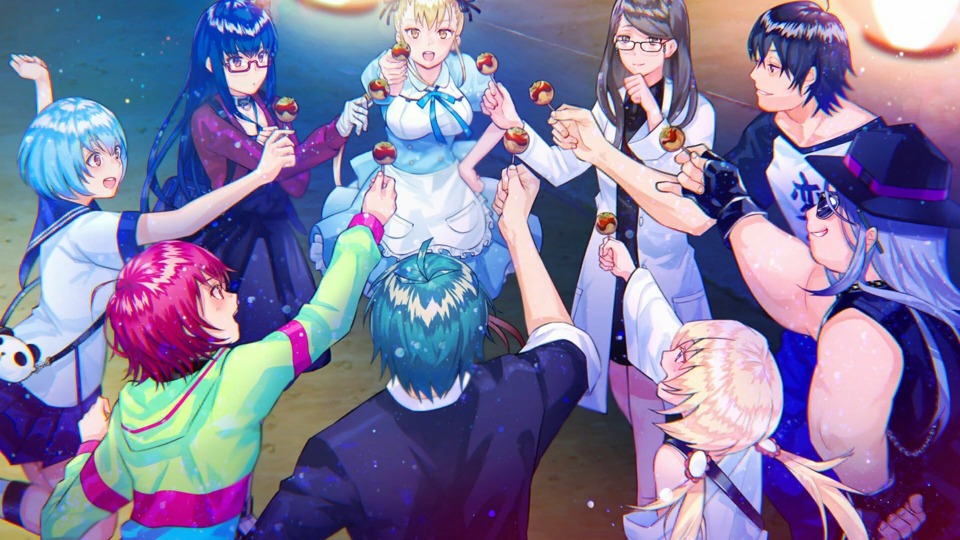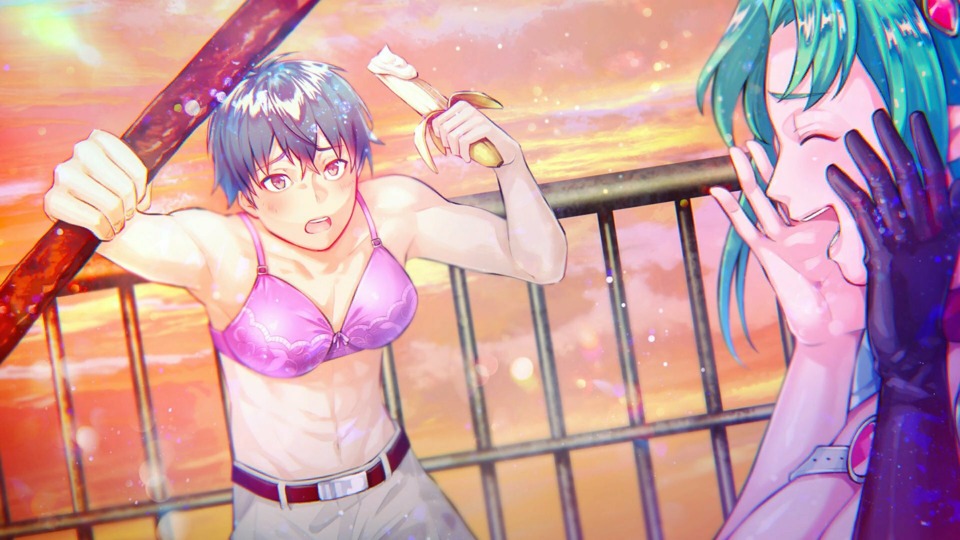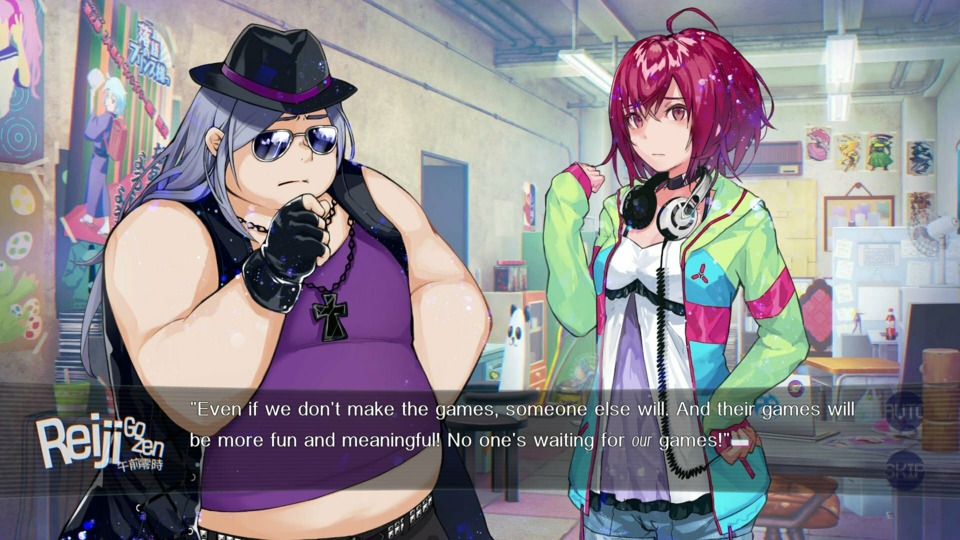VN-ese Waltz: September - Our World is Ended
By Mento 1 Comments
Decided to spend the second half of 2021 checking out some renowned visual novels. Sometimes my ideas aren't any more elaborate than that. I've tried to discuss the following games in as spoiler-free a manner as possible, with a very spoilerish section at the end for my final thoughts on where the story goes.

In retrospect, I've been pretty lucky with all the visual novels I've played so far, both for this VN-ese Waltz feature and overall. VNs have many negative connotations from both those seasoned with the format and those too dubious of the genre to give them a fair shake, and I've known that - in order for those stereotypes to exist - I would inevitably encounter a game where I'd frequently feel embarrassed for playing it. One steeped in harem anime clichés, awkward sexy fanservice, and a branching structure that is too cumbersome to effectively navigate. Our World is Ended is that fearsome epitome of VN tropes made manifest. That isn't to say it's a complete write-off, though. Its thirstiness is usually played off as a joke - though even the implications raised are troubling - and there's no actual ecchi content to be found beyond anime ladies in swimsuits. It's pretty earnest about its feelings, and does eventually flesh out its one-note characters as they all go on their individual arcs. But, boy, it's a journey all right.
So, to set the stage: Our World is Ended follows one of Japan's worst video game developer companies, Judgement 7. Comprised of seven employees, it's a company teetering on the edge of bankruptcy and obscurity after a string of maligned failures. The "company culture" is best described as a chaotic quagmire of competing egos. Its lead programmer and founder is a raging lech, its scenario planner and its graphic designer are both hopeless chuunibyous (i.e. delusional nerds hiding behind personas), its chief musician is a tone-deaf walking disaster of a woman who is more or less Britta from Community and treated with a similar level of disdain and pity, its other programmer is a child prodigy who splits her time hyped up on sugar and fast asleep after crashing and thus needs constant attention, and the only two normal employees are the part-timers given all the thankless tasks to do. You naturally play one of these part-timers - an "Assisting Director" rather than an Assistant Director - whose job it is to corral this messed up bunch into a semi-productive unit. Add to that dynamic a very Steins;Gate conspiracy involving virtual worlds, a shadowy evil cabal planning to rule the globe through AR technology, and the digital specter of the prior, much-beloved director of Judgement 7, and it's a recipe for an episodic anime about deeply flawed people learning to face their fears and overcome their worst impulses by drawing strength from their makeshift dysfunctional family.

To circle back around to Steins;Gate, even in my limited experience with VNs and anime in general it feels like that game - and the series it belongs to - is the most significant source of inspiration for Our World is Ended. The group dynamic and setting is similar (Tokyo's Asakusa district is substituted in for Akihabara) and the story structure is especially similar in the odd way it thematically veers from slice-of-life dating sim lightness to sci-fi outlandishness to suspenseful thriller. The only significant difference is that it took a while to warm up to Steins;Gate's protagonist Rintaro Okabe because of his obnoxious flaws, ones that eventually softened and disappeared with time: while that's the case with almost every character in Our World is Ended, unlike Rintaro these flaws are treated as endearing quirks and left intact throughout. Characters do grow over the narrative so it's not like they're all paper-thin caricatures, but you'll probably find yourself regularly skipping over the voiced dialogue for certain characters (especially the rotund scenario planner Iruka #2, who tends to scream every other line of dialogue). There's a significant amount of sexually-charged humor including some jokes about minors so... well, excessive would be one word for it. Problematic might be another, more accurate one. Basically, if you have a low tolerance for the prurient aspects of low-brow comedic anime this game will test it like an overcaffeinated QA intern.
Then we come to the more mechanical aspects of Our World is Ended, in particular how it deals with branching paths. Mostly, it doesn't: what happens is that you can make decisions, usually responses to lines of dialogue, that brings you closer to one member of Judgement 7 in particular. It's similar to, say, how Final Fantasy VII decides who Cloud goes on a date with at the Golden Saucer: there's a semi-invisible tracker that remembers how many times you jumped to the defense of one character over another, or prioritized them in some other way, and in the pause screen you see the top three matches based on the points you've accrued with them at any given moment. This won't effect the first playthrough: besides a few scenes that change depending on who you're with, the story progresses right up to the "normal" ending regardless. It's in subsequent playthroughs, where you're deliberately picking options to build affinity with a specific character, that you can unlock specific routes that end the story in different ways depending on who you've built the best rapport with. The first playthrough gives you glimpses of what each pairing is like, letting you get an idea not only of what that route might entail (helping the shy artist become more confident in herself, for example) but which choices are more likely to appeal to which characters.

Complicating this is how most of the game's decisions use the "SOS" or "Selection Of Soul" system: those times when the protagonist Reiji is put on the spot and has to quickly think of a response. These responses fly across the screen at different speeds and sizes, making it hard to get a sense of the full spread of options available until some of them have already disappeared. Some responses will earn you points with specific characters so they are integral if you're hunting for the character-specific endings, but it's not always apparent which is the best one and you may take a neutral option without noticing that a far more ideal option has yet to appear or may have already scrolled by in a smaller font. Silence is the result of any SOS decision where you're unable to choose something in time, which usually doesn't affect the subsequent dialogue too much but does make your character come off as a little aloof. It's a bit of an irksome mess, but sticking the other endings behind subsequent playthroughs does make it easier to use that first run as preparation for what's to come. The Skip Text function, vital for replays, will also pause on the line of dialogue immediately preceding one of these SOS decisions thereby giving you time to make a quick save before you jump in and carefully consider all the options available, so the game does at least offer a few QoL boons.
Our World is Ended is easily the worst of the VN games I've played recently, though since that's a short list of Steins;Gate, Raging Loop, and The House in Fata Morgana it's not quite the admonition it sounds like. For all its lasciviousness and awkwardness it does create a compelling story with some decent character and background art, and even if it's incidental you get a pretty decent tour of the sights of Asakusa such as its famous Shion-ji temple and the nearby Tokyo Skytree. Its scenarios - seemingly disconnected misadventures into the virtual landscape of "New World" and its limitless possibilities - have some imaginative if silly ideas involved. (One such instance is when a trickster character forces the group to play the "normie game": they have to spend their time doing normal people (as in, not nerdy shut-in) activities like going on dates and will accrue or lose points each day based on their actions, with the goal to hit at least 100 points by the end of the week. Naturally they all have some trouble with this.) There's a lot of requisite hacking talk which is never so advanced to lose the less tech savvy members of the audience and exploring the characters in more detail helps get past any lingering distaste with their archetypal roles: similar to how the casts of walking clichés in the Tales and Persona franchises are allowed to blossom into something approaching real people with how much of their games' lengthy runtimes are alloted to their development. Our World is Ended does have an issue with typos in that they are plentiful, though fortunately not in the sense that the entire English script felt machine-translated; more that the localizers were seemingly only afforded so much time/resources for proofing the script before the final release deadline, which I imagine must be common enough to games in genres like VNs with all that text to translate. The intent is always clear, at least, and stuff like Japanese puns are properly localized into applicable English versions rather than dousing the screen with Translator's Notes about shiritori and dajare.

I feel like if this review keeps going it'll eventually take on the cadence of someone at an expo trying to convince someone else to check out an anime despite a "rough" first few episodes: make no mistake, this game is sometimes an ordeal to suffer through and sometimes it makes you want to check your door's closed and the curtains are drawn, but overall it isn't a catastrophe and many of its jokes will land in a way that won't have you reaching for the Jim Beam or a 12-gauge. If you like (or can tolerate) media where the hero is continually getting into compromising situations and yelled at by anime girls for being a "hentai" then knock yourself out. Caveat emptor to the rest of you.
I guess I finished the previous rundowns with some spoilery story analysis, so here:
Turns out that I have one more horror-themed VN in my stash and next month is the ideal time to play it. I'll see you all then, page-turning pals.
